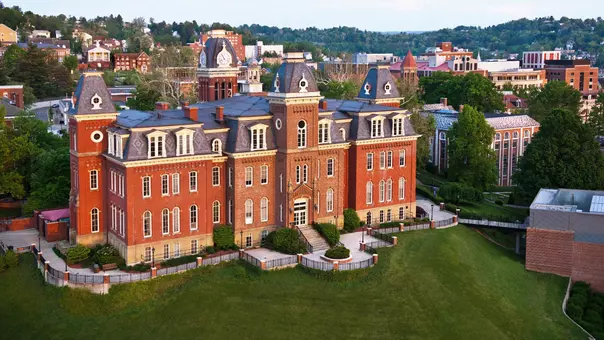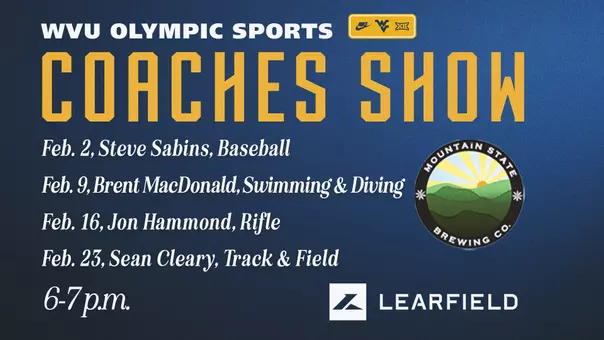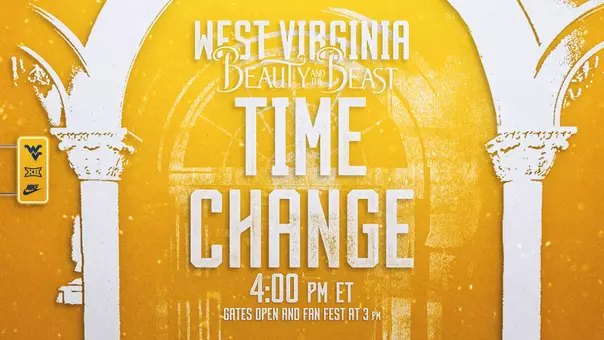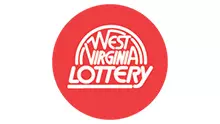Photo by: WVU Athletic Communications
Hoop All-American, Former AD Byrd’s Great Mountaineer Legacy Recalled
January 20, 2022 11:59 AM | General, Blog
MORGANTOWN, W.Va. – Dr. Leland Byrd, one of West Virginia University's all-time athletic greats, died Wednesday morning in Morgantown surrounded by his loving family.
Born in Lynch, Kentucky, on April 8, 1927, the son of Roy and Cornelia Byrd, he was raised in tiny Matoaka in Mercer County, just a hook shot away from Bluefield, and he grew fond of West Virginia University while listening to the Mountaineers perform in the 1942 NIT in New York City and then playing high school basketball for his father.
"My dad had an old car, and we couldn't pick up the game on the local radio station so we had to drive to the top of a mountain to pick it up in Bluefield," Byrd recalled years ago. "We liked Charlie Snowden as an announcer and from that point on, I really wanted to be a Mountaineer."
Despite being a wonderful player with a lethal lefthanded hook shot, the only two schools to offer Byrd scholarships were West Virginia and Marshall. West Virginia, at the time, was just beginning to offer scholarships in sports other than football as a result of the Mountaineers' NIT championship in '42.
Byrd was among the first WVU basketball players to get an athletic grant after Joe Walthall received the initial one in 1943. John Brickels was West Virginia's coach at the time.
"I didn't know a whole lot about him (Brickels) at all," Byrd said. "(Roy) Legs Hawley recruited me, Jimmy Walthall and Bobby Carroll from Wheeling. And Brickels brought in Dave Wilson and Jack Dial from Huntington.
Byrd, Wilson, Carroll, Walthall, Clyde "Hard Times" Green and later Fred Schaus, Eddie Beach and Eddie Sterling formed the nucleus of Lee Patton's powerhouse Mountaineer basketball teams in the late 1940s that won 60 of 69 games during a three-year period from 1945-47 and began a 57-game winning streak at the Field House that ended in 1949, one year after Byrd had graduated from WVU.
Known as the "Hammer," Byrd led the Mountaineers to NIT appearances in 1945, 1946 and 1947 when the NIT was still considered on par with the NCAA Tournament. WVU had to play in the NIT in those days because it was not a member of a conference and did not have access to the NCAA Tournament.
 The best of those Mountaineer teams was the 1946 squad that won 24 games and lost to NIT champion Kentucky 58-51 in the semifinals in New York City. Byrd's outstanding performances in the Big Apple, including scoring a career-high 28 points against Joe Lapchick-coached St. John's, helped him become only the second cager in school history to earn All-America honors in 1947.
The best of those Mountaineer teams was the 1946 squad that won 24 games and lost to NIT champion Kentucky 58-51 in the semifinals in New York City. Byrd's outstanding performances in the Big Apple, including scoring a career-high 28 points against Joe Lapchick-coached St. John's, helped him become only the second cager in school history to earn All-America honors in 1947.
Scotty Hamilton was West Virginia's first five years prior in 1942.
"We were all West Virginians with one player from Maryland (Bob Stakem) my freshman year," Byrd said. "We all came to Morgantown from small schools. That crowd at the old Field House was right on top of you so we were used to the crowd and the noise and when we went to the Garden we were usually the underdogs.
"The New York crowd loved the underdog, so we usually had more support than the other teams that weren't local. So many teams were awed by the crowd, but the 17,000 we played in front of in New York didn't bother us at all."
Years later, nationally known New York City sportswriter Dave Anderson once told West Virginia's young sports information director Eddie Barrett that West Virginia and Kentucky had the two best basketball reputations in the country. That came on the basis of the foundation established during Byrd's years in the 1940s that led to WVU's run of All-American players Mark Workman, Rod Hundley, Jerry West and Rod Thorn into the early 1960s.
Byrd's teams were also responsible for starting the dominance West Virginia enjoyed against rival Pitt in the 1940s, 1950s and early 1960s.
"Leland Byrd was the blankety-blank who always beat us," Panther coach H.C. "Doc" Carlson once said. "I remember one time I looked out there on the floor and (his) shoulders seemed to be slumping a little. We had a four-point lead and there wasn't much time left. I told my boys it looked like we would win this one because we had Byrd down.
"But the first thing you know, he stole the ball and scored, and then he broke up another play to tie the game, and that finished us."
Byrd was drafted by the New York Knicks and spent a month with them before being drafted into the Army. In 1950, he returned to WVU to complete the first of his two post-graduate degrees. He later earned his doctorate degree in 1967.
In the meantime, a second stint in the Army led him to Red River Arsenal in Texarkana, Texas, where he met his wife, Elizabeth Louise Machen, in 1952.
A series of moves followed to Hinton High in Hinton, West Virginia, Glenville State College and then Miami-Dade Junior College until his return to WVU in 1972 as the school's fifth director of athletics.
Byrd's seven-year tenure at West Virginia is considered among the most impactful in school history. With just one week on the job, he was required to make one of the most transformative decisions of his entire athletic career – the adoption of women's sports at West Virginia University. Title IX had made it a law for institutions receiving federal aid to provide equal athletic opportunities for women, and retiring athletic director Red Brown left that one for Brown to handle.
"I had a message on my desk from Dr. (Wincie) Carruth, Kittie Blakemore and Martha Thorn and they wanted an audience with me," Byrd recalled in 2013.
It was more of an ambush than it was a meeting.
"At the time, the handwriting was on the wall," the late Blakemore recalled in 2013. "You have a big land-grant institution that was going to lose a lot of federal money if they don't go with this. The thing that held it up in '72 was the fact that the state didn't know how they were going to pay the coaches. Well, when they finally realized that the coaches were already being paid because we were teacher-coaches, then they didn't have any question about it."
What Byrd did was take an athletic department that was operating on a shoestring budget and made it work smoothly for everyone involved.
"I remember telling them at the time, 'I don't know where I'll find (the money), but you've got $5,000 this first year.' To my knowledge, Kittie took $1,000, (women's tennis coach) Martha (Thorn) took $1,000 and that's how we started," he said.
By the time Byrd left in 1979, the women's sports budget had significantly increased and all of them were beginning to offer scholarships.
Another transformative decision Byrd made happened in 1976, right after football coach Bobby Bowden left to take the Florida State job. Byrd, who had resisted cries from unhappy alums who wanted Bowden fired after an unsuccessful 1974 season, saw his football coach leave a year later, in part, because of the deteriorating condition of Mountaineer Field.
Byrd initially went to the State Legislature to ask for an appropriation of $10 million to refurbish Mountaineer Field, but a movement organized by the Charleston Elks Club pressured legislators to consider building a new stadium at another location in Morgantown.
To his great credit, Byrd adjusted the plan when it became clear that a more popular one was put forth by those Elks Club members who had sent letters to their individual legislators in support of a new $20 million stadium.
 Byrd and his assistant athletic director Paul Miller had to do the lobbying because WVU president Jim Harlow was not permitted at the time to go before to the Legislature to solicit funding.
Byrd and his assistant athletic director Paul Miller had to do the lobbying because WVU president Jim Harlow was not permitted at the time to go before to the Legislature to solicit funding.
"We had overwhelming support in the House, but we were not sure what the Senate would do," Byrd recalled in 2020. "At that point there were two proposals – one for $10 million to renovate the old stadium and the other was $20 million for the new stadium."
When Senate President William Brotherton Jr. proposed an amendment considering just funding for a new stadium, the entire process crystalized and the legislature passed a bill issuing funding for a new football stadium, new basketball arenas for Marshall and West Liberty and some campus facilities for other schools in the state.
Byrd, Dr. Peter Yost and the University's architect at the time were part of a three-person planning committee for the new football stadium. They visited the University of Kansas, Iowa State and the Buffalo Bills stadium in Orchard Park, New York, seeking input.
Byrd's team chose a design similar to Iowa State's football stadium, now known as Jack Trice Stadium.
"The West Virginia State Planning Board and the state architect at the time appointed Finch-Heery out of Atlanta to do the architectural design and Gates Engineering out of Beckley to do the engineering, so they became co-managers of the project," Byrd said. "We met them and gave them our recommendations and they took over from there. That was about the last of my involvement before moving on to become commissioner of the Eastern 8 Conference."
It was Gov. Jay Rockefeller, West Virginia University president Gene Budig and athletic director Dick Martin who maintained the course that was established by Byrd's team to complete the stadium near the University hospital in 1980.
"Dr. Byrd was so professional and so pleasant to be around," recalled former WVU director of athletics Ed Pastilong, who was involved in the stadium construction process as West Virginia's facility manager at the time. "He was such a good listener and was always open-minded and willing to explore other alternatives.
"He always knew what worked well for West Virginia University, and I was honored to be hired by him. Mona and I always enjoyed spending time with Dr. Byrd and his wife, Elizabeth, and we are saddened to learn of his passing."
Soon after the stadium became operational, Don Nehlen used it to his advantage to build a top-20 football program in the early 1980s.
"I think the right place was chosen, and it really worked out well," Byrd noted two years ago. "I don't think enough credit has been given to (football coach) Frank Cignetti and Paul Miller for the work they did in really pushing this with the Legislature.
"We were down there for an entire week and Frank was really able to explain why we needed to do something about our stadium for recruiting and for the fans. And, of course, Paul knew a lot of the legislators and he worked pretty much with them on the funding aspect and what it would take to do that. It took a lot more than the initial $20 million to get that thing built."
Years later, Byrd was certain the West Virginia University we know and love today would have been dramatically different if the plans for that stadium fell through because of politics or parochial concerns.
"We wouldn't have been in any shape to get into the conferences we got into with the old stadium the way it was," Byrd explained. "We were very fortunate to get a new stadium."
"That football stadium was a major feat for Leland," J. William Douglas, retired dean of the WVU School of Physical Education and longtime friend, said. Douglas noted that Byrd was responsible for jumpstarting his career in collegiate administration at Glenville State College in 1962.
Byrd was involved with one other transformative decision that greatly benefited athletics – the hiring of men's basketball coach Gale Catlett.
Byrd and Red Brown drove over to Cincinnati to gauge Catlett's interest in the WVU basketball job in 1974, but Catlett wasn't interested because of the way head coaching contracts at WVU were structured at the time.
State law prohibited West Virginia coaches from receiving multiple-year contracts, which made it virtually impossible to recruit athletes to WVU at the time. That was another significant factor in Bowden's decision to leave West Virginia for Florida State, and Byrd knew a workaround was required to attract top-quality coaches.
His solution was to work with University president Gene Budig and WVU Foundation president Lysander Dudley to underwrite future head coaching contracts, and that's how they were able to land Catlett in 1978. Byrd said this became a possibility when it was discovered that the University hospital was using the Foundation to attract surgeons and doctors.
Two years later, Nehlen was hired in a similar fashion through the WVU Foundation.
"Dr. Byrd was a great Mountaineer player and was also a great athletic administrator at West Virginia University," Catlett said Wednesday afternoon. "I'm so thankful that he brought us back to West Virginia, and we were able to spend 24 wonderful years at my alma mater.
"He was such an intelligent man, and he always choose his friendships carefully," Catlett added. "There were things we needed immediately as a basketball program in order to be successful and he helped make those things happen. Anise and I always admired Dr. Byrd, and we send our thoughts and prayers to Elizabeth and her family."
 Following a four-year stint as Eastern 8 commissioner, Byrd returned to campus life as Western Michigan's athletic director in 1984, serving in that capacity until his retirement in 1992.
Following a four-year stint as Eastern 8 commissioner, Byrd returned to campus life as Western Michigan's athletic director in 1984, serving in that capacity until his retirement in 1992.
During his retirement years, he chose to relocate to Morgantown while also having a winter home in Fort Lauderdale, Florida. Over the years, he received many honors, including induction into the West Virginia Sportswriters Hall of Fame in 1986, the WVU Physical Education Hall of Fame in 1989 and WVU's inaugural Sports Hall of Fame in 1991.
He was also active on many NCAA committees and was on the board of the U.S. Information Agency.
In 2010, athletics introduced the Leland Byrd Leadership Award, presented to the top WVU men's and women's basketball players for their leadership qualities on and off the court. He was also an Eagle Scout, president of the WVU Junior Class and a member of the Mountain honorary.
He was named an inaugural member of WVU's Mountaineer Legends Society in 2017.
"Leland Byrd was more than a standout student-athlete, more than an innovative director of Athletics creating countless opportunities for the University during his tenure. He was a devoted husband to his wife, Elizabeth, and a devoted father to his five wonderful daughters, including Becky who established a scholarship in his name to give young men and women the opportunity to pursue their dreams of a college education," WVU President Gordon Gee said. "My thoughts are with Elizabeth and their daughters. He was a true Mountaineer and will be forever missed."
"We are saddened to learn of the passing of Leland Byrd," Director of Athletics Shane Lyons added. "As a player, he was a basketball All-American. As an administrator, he ushered in the start of NCAA women's sports at WVU and led the planning for a new football stadium. Dr. Byrd's legacy as a great Mountaineer will live on forever. Our condolences and thoughts are with his family."
Byrd, 94, is survived by his wife of 69 years, Elizabeth, and their five West Virginia-born daughters Deborah, Becky, Cindy, Mary and Nancy, as well as numerous grandchildren and great grandchildren.
Daughter Becky Lofstead for years served as West Virginia University's assistant vice president for University relations.
"Dad was incredibly accomplished as an athlete, coach, administrator and mentor-- but just so humble," she said. "He was the sweetest man I've ever known -- a wonderful and loving father, grandfather, great grandfather, husband and friend. He loved West Virginia and his alma mater, West Virginia University, so very much.
"The world lost a truly great man (Wednesday)," she concluded.
Born in Lynch, Kentucky, on April 8, 1927, the son of Roy and Cornelia Byrd, he was raised in tiny Matoaka in Mercer County, just a hook shot away from Bluefield, and he grew fond of West Virginia University while listening to the Mountaineers perform in the 1942 NIT in New York City and then playing high school basketball for his father.
"My dad had an old car, and we couldn't pick up the game on the local radio station so we had to drive to the top of a mountain to pick it up in Bluefield," Byrd recalled years ago. "We liked Charlie Snowden as an announcer and from that point on, I really wanted to be a Mountaineer."
Despite being a wonderful player with a lethal lefthanded hook shot, the only two schools to offer Byrd scholarships were West Virginia and Marshall. West Virginia, at the time, was just beginning to offer scholarships in sports other than football as a result of the Mountaineers' NIT championship in '42.
Byrd was among the first WVU basketball players to get an athletic grant after Joe Walthall received the initial one in 1943. John Brickels was West Virginia's coach at the time.
"I didn't know a whole lot about him (Brickels) at all," Byrd said. "(Roy) Legs Hawley recruited me, Jimmy Walthall and Bobby Carroll from Wheeling. And Brickels brought in Dave Wilson and Jack Dial from Huntington.
Byrd, Wilson, Carroll, Walthall, Clyde "Hard Times" Green and later Fred Schaus, Eddie Beach and Eddie Sterling formed the nucleus of Lee Patton's powerhouse Mountaineer basketball teams in the late 1940s that won 60 of 69 games during a three-year period from 1945-47 and began a 57-game winning streak at the Field House that ended in 1949, one year after Byrd had graduated from WVU.
Known as the "Hammer," Byrd led the Mountaineers to NIT appearances in 1945, 1946 and 1947 when the NIT was still considered on par with the NCAA Tournament. WVU had to play in the NIT in those days because it was not a member of a conference and did not have access to the NCAA Tournament.
 The best of those Mountaineer teams was the 1946 squad that won 24 games and lost to NIT champion Kentucky 58-51 in the semifinals in New York City. Byrd's outstanding performances in the Big Apple, including scoring a career-high 28 points against Joe Lapchick-coached St. John's, helped him become only the second cager in school history to earn All-America honors in 1947.
The best of those Mountaineer teams was the 1946 squad that won 24 games and lost to NIT champion Kentucky 58-51 in the semifinals in New York City. Byrd's outstanding performances in the Big Apple, including scoring a career-high 28 points against Joe Lapchick-coached St. John's, helped him become only the second cager in school history to earn All-America honors in 1947.Scotty Hamilton was West Virginia's first five years prior in 1942.
"We were all West Virginians with one player from Maryland (Bob Stakem) my freshman year," Byrd said. "We all came to Morgantown from small schools. That crowd at the old Field House was right on top of you so we were used to the crowd and the noise and when we went to the Garden we were usually the underdogs.
"The New York crowd loved the underdog, so we usually had more support than the other teams that weren't local. So many teams were awed by the crowd, but the 17,000 we played in front of in New York didn't bother us at all."
Years later, nationally known New York City sportswriter Dave Anderson once told West Virginia's young sports information director Eddie Barrett that West Virginia and Kentucky had the two best basketball reputations in the country. That came on the basis of the foundation established during Byrd's years in the 1940s that led to WVU's run of All-American players Mark Workman, Rod Hundley, Jerry West and Rod Thorn into the early 1960s.
Byrd's teams were also responsible for starting the dominance West Virginia enjoyed against rival Pitt in the 1940s, 1950s and early 1960s.
"Leland Byrd was the blankety-blank who always beat us," Panther coach H.C. "Doc" Carlson once said. "I remember one time I looked out there on the floor and (his) shoulders seemed to be slumping a little. We had a four-point lead and there wasn't much time left. I told my boys it looked like we would win this one because we had Byrd down.
"But the first thing you know, he stole the ball and scored, and then he broke up another play to tie the game, and that finished us."
Byrd was drafted by the New York Knicks and spent a month with them before being drafted into the Army. In 1950, he returned to WVU to complete the first of his two post-graduate degrees. He later earned his doctorate degree in 1967.
In the meantime, a second stint in the Army led him to Red River Arsenal in Texarkana, Texas, where he met his wife, Elizabeth Louise Machen, in 1952.
A series of moves followed to Hinton High in Hinton, West Virginia, Glenville State College and then Miami-Dade Junior College until his return to WVU in 1972 as the school's fifth director of athletics.
Byrd's seven-year tenure at West Virginia is considered among the most impactful in school history. With just one week on the job, he was required to make one of the most transformative decisions of his entire athletic career – the adoption of women's sports at West Virginia University. Title IX had made it a law for institutions receiving federal aid to provide equal athletic opportunities for women, and retiring athletic director Red Brown left that one for Brown to handle.
"I had a message on my desk from Dr. (Wincie) Carruth, Kittie Blakemore and Martha Thorn and they wanted an audience with me," Byrd recalled in 2013.
It was more of an ambush than it was a meeting.
"At the time, the handwriting was on the wall," the late Blakemore recalled in 2013. "You have a big land-grant institution that was going to lose a lot of federal money if they don't go with this. The thing that held it up in '72 was the fact that the state didn't know how they were going to pay the coaches. Well, when they finally realized that the coaches were already being paid because we were teacher-coaches, then they didn't have any question about it."
What Byrd did was take an athletic department that was operating on a shoestring budget and made it work smoothly for everyone involved.
"I remember telling them at the time, 'I don't know where I'll find (the money), but you've got $5,000 this first year.' To my knowledge, Kittie took $1,000, (women's tennis coach) Martha (Thorn) took $1,000 and that's how we started," he said.
By the time Byrd left in 1979, the women's sports budget had significantly increased and all of them were beginning to offer scholarships.
Another transformative decision Byrd made happened in 1976, right after football coach Bobby Bowden left to take the Florida State job. Byrd, who had resisted cries from unhappy alums who wanted Bowden fired after an unsuccessful 1974 season, saw his football coach leave a year later, in part, because of the deteriorating condition of Mountaineer Field.
Byrd initially went to the State Legislature to ask for an appropriation of $10 million to refurbish Mountaineer Field, but a movement organized by the Charleston Elks Club pressured legislators to consider building a new stadium at another location in Morgantown.
To his great credit, Byrd adjusted the plan when it became clear that a more popular one was put forth by those Elks Club members who had sent letters to their individual legislators in support of a new $20 million stadium.
 Byrd and his assistant athletic director Paul Miller had to do the lobbying because WVU president Jim Harlow was not permitted at the time to go before to the Legislature to solicit funding.
Byrd and his assistant athletic director Paul Miller had to do the lobbying because WVU president Jim Harlow was not permitted at the time to go before to the Legislature to solicit funding."We had overwhelming support in the House, but we were not sure what the Senate would do," Byrd recalled in 2020. "At that point there were two proposals – one for $10 million to renovate the old stadium and the other was $20 million for the new stadium."
When Senate President William Brotherton Jr. proposed an amendment considering just funding for a new stadium, the entire process crystalized and the legislature passed a bill issuing funding for a new football stadium, new basketball arenas for Marshall and West Liberty and some campus facilities for other schools in the state.
Byrd, Dr. Peter Yost and the University's architect at the time were part of a three-person planning committee for the new football stadium. They visited the University of Kansas, Iowa State and the Buffalo Bills stadium in Orchard Park, New York, seeking input.
Byrd's team chose a design similar to Iowa State's football stadium, now known as Jack Trice Stadium.
"The West Virginia State Planning Board and the state architect at the time appointed Finch-Heery out of Atlanta to do the architectural design and Gates Engineering out of Beckley to do the engineering, so they became co-managers of the project," Byrd said. "We met them and gave them our recommendations and they took over from there. That was about the last of my involvement before moving on to become commissioner of the Eastern 8 Conference."
It was Gov. Jay Rockefeller, West Virginia University president Gene Budig and athletic director Dick Martin who maintained the course that was established by Byrd's team to complete the stadium near the University hospital in 1980.
"Dr. Byrd was so professional and so pleasant to be around," recalled former WVU director of athletics Ed Pastilong, who was involved in the stadium construction process as West Virginia's facility manager at the time. "He was such a good listener and was always open-minded and willing to explore other alternatives.
"He always knew what worked well for West Virginia University, and I was honored to be hired by him. Mona and I always enjoyed spending time with Dr. Byrd and his wife, Elizabeth, and we are saddened to learn of his passing."
Soon after the stadium became operational, Don Nehlen used it to his advantage to build a top-20 football program in the early 1980s.
"I think the right place was chosen, and it really worked out well," Byrd noted two years ago. "I don't think enough credit has been given to (football coach) Frank Cignetti and Paul Miller for the work they did in really pushing this with the Legislature.
"We were down there for an entire week and Frank was really able to explain why we needed to do something about our stadium for recruiting and for the fans. And, of course, Paul knew a lot of the legislators and he worked pretty much with them on the funding aspect and what it would take to do that. It took a lot more than the initial $20 million to get that thing built."
Years later, Byrd was certain the West Virginia University we know and love today would have been dramatically different if the plans for that stadium fell through because of politics or parochial concerns.
"We wouldn't have been in any shape to get into the conferences we got into with the old stadium the way it was," Byrd explained. "We were very fortunate to get a new stadium."
"That football stadium was a major feat for Leland," J. William Douglas, retired dean of the WVU School of Physical Education and longtime friend, said. Douglas noted that Byrd was responsible for jumpstarting his career in collegiate administration at Glenville State College in 1962.
Byrd was involved with one other transformative decision that greatly benefited athletics – the hiring of men's basketball coach Gale Catlett.
Byrd and Red Brown drove over to Cincinnati to gauge Catlett's interest in the WVU basketball job in 1974, but Catlett wasn't interested because of the way head coaching contracts at WVU were structured at the time.
State law prohibited West Virginia coaches from receiving multiple-year contracts, which made it virtually impossible to recruit athletes to WVU at the time. That was another significant factor in Bowden's decision to leave West Virginia for Florida State, and Byrd knew a workaround was required to attract top-quality coaches.
His solution was to work with University president Gene Budig and WVU Foundation president Lysander Dudley to underwrite future head coaching contracts, and that's how they were able to land Catlett in 1978. Byrd said this became a possibility when it was discovered that the University hospital was using the Foundation to attract surgeons and doctors.
Two years later, Nehlen was hired in a similar fashion through the WVU Foundation.
"Dr. Byrd was a great Mountaineer player and was also a great athletic administrator at West Virginia University," Catlett said Wednesday afternoon. "I'm so thankful that he brought us back to West Virginia, and we were able to spend 24 wonderful years at my alma mater.
"He was such an intelligent man, and he always choose his friendships carefully," Catlett added. "There were things we needed immediately as a basketball program in order to be successful and he helped make those things happen. Anise and I always admired Dr. Byrd, and we send our thoughts and prayers to Elizabeth and her family."
 Following a four-year stint as Eastern 8 commissioner, Byrd returned to campus life as Western Michigan's athletic director in 1984, serving in that capacity until his retirement in 1992.
Following a four-year stint as Eastern 8 commissioner, Byrd returned to campus life as Western Michigan's athletic director in 1984, serving in that capacity until his retirement in 1992.During his retirement years, he chose to relocate to Morgantown while also having a winter home in Fort Lauderdale, Florida. Over the years, he received many honors, including induction into the West Virginia Sportswriters Hall of Fame in 1986, the WVU Physical Education Hall of Fame in 1989 and WVU's inaugural Sports Hall of Fame in 1991.
He was also active on many NCAA committees and was on the board of the U.S. Information Agency.
In 2010, athletics introduced the Leland Byrd Leadership Award, presented to the top WVU men's and women's basketball players for their leadership qualities on and off the court. He was also an Eagle Scout, president of the WVU Junior Class and a member of the Mountain honorary.
He was named an inaugural member of WVU's Mountaineer Legends Society in 2017.
"Leland Byrd was more than a standout student-athlete, more than an innovative director of Athletics creating countless opportunities for the University during his tenure. He was a devoted husband to his wife, Elizabeth, and a devoted father to his five wonderful daughters, including Becky who established a scholarship in his name to give young men and women the opportunity to pursue their dreams of a college education," WVU President Gordon Gee said. "My thoughts are with Elizabeth and their daughters. He was a true Mountaineer and will be forever missed."
"We are saddened to learn of the passing of Leland Byrd," Director of Athletics Shane Lyons added. "As a player, he was a basketball All-American. As an administrator, he ushered in the start of NCAA women's sports at WVU and led the planning for a new football stadium. Dr. Byrd's legacy as a great Mountaineer will live on forever. Our condolences and thoughts are with his family."
Byrd, 94, is survived by his wife of 69 years, Elizabeth, and their five West Virginia-born daughters Deborah, Becky, Cindy, Mary and Nancy, as well as numerous grandchildren and great grandchildren.
Daughter Becky Lofstead for years served as West Virginia University's assistant vice president for University relations.
"Dad was incredibly accomplished as an athlete, coach, administrator and mentor-- but just so humble," she said. "He was the sweetest man I've ever known -- a wonderful and loving father, grandfather, great grandfather, husband and friend. He loved West Virginia and his alma mater, West Virginia University, so very much.
"The world lost a truly great man (Wednesday)," she concluded.
United Bank Playbook: TCU Preview
Friday, February 20
Ross Hodge | Utah Postgame
Thursday, February 19
Honor Huff & Chance Moore | Utah Postgame
Thursday, February 19
Riley Makalusky | Feb. 18
Wednesday, February 18















